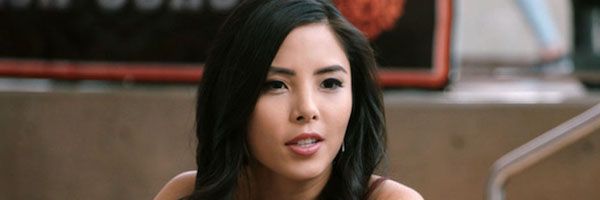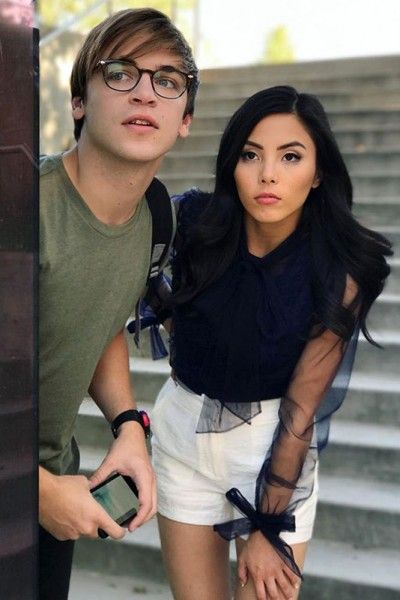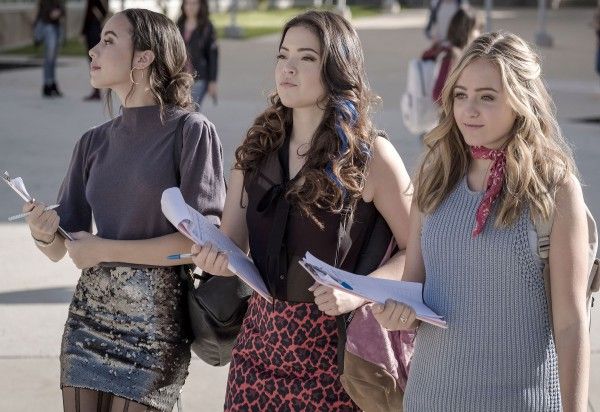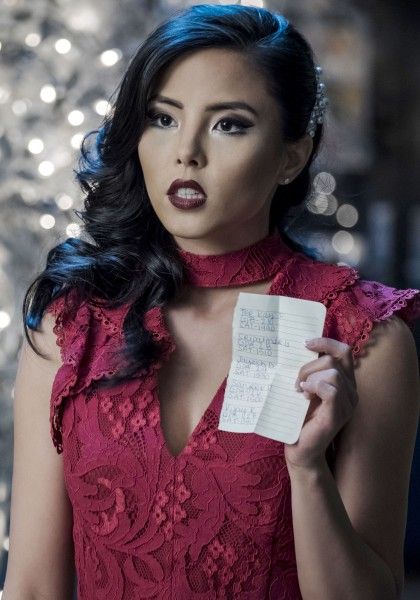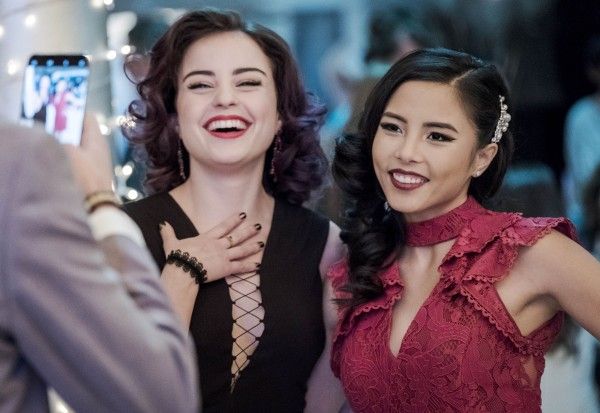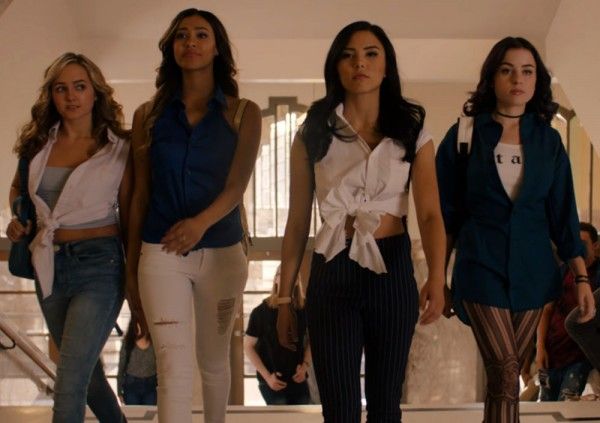If you’re looking for a fun, smart, funny new high school series that takes on a variety of social issues, look no further than Youth & Consequences, now streaming at YouTube Red. The story follows powerful trendsetter Farrah Cutney (YouTube sensation Anna Akana), the queen of Central Rochester High, who you quickly learn is way more complicated and complex than she seems on her mean girl surface. As her rivals rise, Farrah will stop at nothing to keep her power and respect, but will also often do the right thing when she sees someone being wronged and feels she can do something to stop it.
During this 1-on-1 phone interview with Collider, Anna Akana (who is also an executive producer on the series) talked about how Youth & Consequences came about, why she loves YouTube as an outlet for original content, when she realized that she was good at comedy, how she views Farrah and how Farrah views herself, why it was important to her that the show also tackle real issues, her character’s moral code, and her hope to continue doing more episodes. She also talked about getting her voice heard in a predominantly male business, wanting to direct, and working in a variety of mediums.
Collider: How did Youth & Consequences come about? Had you been actively trying to find the right TV series to do?
ANNA AKANA: The script was sent to me, three years ago, by my manager. I go out for a lot of teen stuff and one of my main compliments was that a lot of the scripts were so stereotypical and treat teens like idiots. We’ve all been teens before, but we weren’t necessarily idiots. Everything just feels so heightened because you’re going through so much and your reference level for life is so small. I think what (show creator) Jason [Ubaldi] did brilliantly was making this sophisticated and complex and real, in a fun way, with the whole Mean Girls facade that is then revealed that she’s actually a benevolent dictator. I was like, “I have to do this show! I have to meet the guy who wrote this!” When Jason and I first met, I always say that he was like a 17-year-old girl stuck in the body of a man. We just clicked and got along so well. And so, we went looking for a home for the series, and YouTube said, “We love this script and want to do it, and we believe in you guys and we’re down to have you have most of the creative control.” It’s just been a wonderful dream-come-true project for me.
As a YouTube personality, you were essentially a one-woman show who was responsible for your own content. What do you like about YouTube, as an outlet for original content?
AKANA: I love them! I’ve always thought of YouTube as a playground and a place to try anything you want to try and experiment with. With the original programming, it’s been great because they have traditional money for original content. I feel so incredibly supported. There are flaws to being a one-woman show. I’m not the best DP, I’m not the best sound person, etc. It’s very lo-fi and indie. But with something like this, I feel very supported, in every respect. I have a studio, I have a network, and I have a team of people who love what they do and who are very good at what they do, and I can rely on people to put their best foot forward and make something amazing and elevated. It’s been a wonderful partnership for me, in the micros sense, but also in the macro sense of being on a platform where there’s just so much opportunity there.
You’ve said that because you look very young, you go out for a lot of high school characters. How do you feel about that?
AKANA: I love high school shows! I’m a sucker for Riverdale and Gilmore Girls. The older I got, I was like, “Oh, man, I really want to do a high school show, before I age out of it!” It’s been awesome to finally do a high school show that I love. In five years, I probably can’t play this age anymore, so it’s divine timing.
You’ve used humor and wit to establish yourself as an online personality, and that also translates really well to this series. When did you realize that was something you were good at and that it could work for you?
AKANA: I actually started in stand-up when I was 19, and I was performing multiple times a night, every night, for three or four years. When you first start, you’re doing bowling alleys and coffee shops, and I started to really understand how to get people’s attention when they weren’t there to watch you. With YouTube, it felt like there were so many more tools available. It wasn’t just me, on a stage, at the microphone. Now, I had editing capabilities, I could put in VFX, and there was just so much more to play with. Humor has always been a coping mechanism for me and a way in, so it was naturally the place that I wanted to be.
How do you view Farrah, and how do you think she’d describe herself?
AKANA: I think Farrah is really interesting and complex. She’s not entirely good, and she’s not entirely bad. The most fascinating thing about her is that she does think she knows what’s best for everyone and she has her own agenda. She wants to carry out her own sense of justice, when she views something as being wrong. She’s very manipulative and maybe thinks of herself in a little bit too high of regard. She feels like she’s trying to be an adult and control her own world. I think that she views herself as powerful and not necessarily manipulative, but in control. She’s a bit of a mother figure to everybody.
Was it also important to you that this show cover real, important and serious issues that teens, and all of us, face?
AKANA: Yes, absolutely! As an actor, you don’t get a lot of say in the creative process, so coming on as an EP on this, it was very important to have diversity and complex female characters, but it was also an opportunity to comment on society. When Jason wrote the pilot, he knew Hilary [Clinton] was thinking of running and that Trump was potentially running, as well, so he really wanted to use the catalyst of the election to showcase that we are going to take current headlines and discuss them. We tackle transgender bathroom laws, and social media and how that’s affected privacy, from being stalked to being outed. Especially with teens nowadays, now that they have access to the internet so young, they grow up a lot faster. They have opinions on gun control and have to do active shooter drills. If those are the kinds of people that are going to watch our show, we should inform them of what our stance on all of these issues are and take responsibility for getting those kinds of messages across.
It seems like eight 30-minute episodes is barely enough to scratch the surface of what you can do with this story and these characters. Has that been discussions about where these characters could go and what you could do with future seasons?
AKANA: Absolutely! Jason and I have talked about what it would look like, up to Season 5. We have Season 2 a little bit more fleshed out, but we also want to keep it very open. We wanted to establish all of the players and relationships, but at the end of the day, the storytelling has to be emotional and you have to care about the characters. Everything else is just cherries on top. So, we do have some ideas of issues that we want to tackle in Season 2, but we’re really trying to make sure we fill out the emotional arcs for all of the characters. Jason is such a brilliant writer that all of his initial ideas are already so strong and so good.
In the season, Farrah says, “The only way to get respect is to take it.” Do you feel like that’s not only good advice in high school, but in life, in general?
AKANA: Yeah, I do! I’m a person who has some difficulty demanding respect, or even saying no. Also, as a woman and as an Asian woman, you’re taught to be subservient and bend over backward for other people, to accommodate other people. I often hear myself saying, “I’m sorry.” I love the way that Farrah comes into a room and is not afraid to be disliked. That idea and what she represents, in that respect, is so important for everyone to have.
What is Farrah’s moral code?
AKANA: I would say that her moral code is what she believes is fair. I think she can be a little black and white. Because she’s a teenager and she hasn’t been in so many grey areas, she doesn’t understand nuance and complexity. She’s very much about there being a right and wrong, and that she knows the difference and draws that line. That gets confronted in Season 1. There are grey areas. You don’t understand every facet of a relationship, and it’s not up to you to be able to judge who’s wrong and who’s right, in a situation. She doesn’t have the real world experience yet, beyond high school.
Because you’re used to doing your own material, do you feel that makes you more comfortable and confident with improvising on set?
AKANA: Yes, 100%. Doing YouTube and having to get used to looking down the barrel of a camera was very nerve-wracking. It took me awhile to feel comfortable talking to that, especially if it’s personal. Being a personality is a skill, and I don’t discount anyone’s hard work in getting there. If it seems effortless, it means they put a lot of work into it. I think it’s really helped me command a set and command a room, and just be more comfortable with having eyes on me.
As a woman in a business that’s still predominantly male-run, when do you feel like your own voice started to be heard and that you got a real say in what you were doing and wanted to do?
AKANA: I’ve been really lucky. Amassing an audience in digital had helped me, tremendously, in having that sense of power and control. Being a woman with a show, I had to get used to being a leader, very quickly. Doing stand-up, since I was 19, has also helped tremendously because you have to command a room, you have to set the energy, and you set the tone for how people are going to feel. Only a few years ago, did I really come into my own. I’ve always been comfortable, business-wise, taking leadership. Only recently, I’ve felt that I can take that kind of responsibility on, personally, as well.
Do you know what’s next for you, as an actress, and what you’d like to accomplish next?
AKANA: I definitely hope we get more seasons of Youth & Consequences, since it’s a dream project for me. I also really want to direct a feature, so I’ve been working on that. I sold a feature last year, that I’m not allowed to talk about just yet, I’m out with another one, and I’m writing a current one. Getting more stories out there and being more of a director on set, along with acting, has been a big goal of mine.
Are you looking to keep a balance between film and TV projects?
AKANA: Whatever feels right to me is what I do. Late last year, I was like, “Oh, I need to write an album,” so I started working on that in the fall. Earlier this year, I was like, “Oh, I have to do a stop-motion thing,” so I’ve been doing stop-motion, as well. I try to listen to whatever I feel passionate about because that always works. If you’re excited, curious and passionate about something, it’s going to turn out really well and you’re going to learn something valuable from it.
Youth & Consequences is available to stream at YouTube Red.

